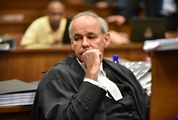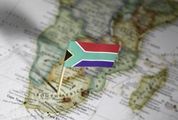Zuma as a former spy is important in understanding the Moyane-Gordhan battle
by Steven Friedman,
2016-03-02 05:41:18.0
IF WE want to understand the battle between South African Revenue Service (SARS) commissioner Tom Moyane and the Treasury, we need to take more seriously the public role of the security cluster.
Come to think of it, doing this would also help us understand our public life better.
The SARS problem has been with us for a while. It has generated a mound of sworn statements, which have been covered in media reports. They tell of an attack on SARS aimed at protecting illegal cigarette smugglers, some of whom were also agents of national intelligence.
In their plan to remove skilled SARS investigators who they very much did not want to investigate them, they came up with the claim that SARS, under Pravin Gordhan, had run an illegal "rogue" investigative unit. Mr Moyane is an enthusiastic peddler of their story, which is what is now being used by the Hawks to badger Finance Minister Pravin Gordhan.
So intelligence agents play a key role in the saga. This is not their only contribution to our national life — remember their habit of concocting smears on politicians and trade unionists? And the intelligence agencies as a bloc were behind the Protection of State Information Bill. While reports portrayed it as an attempt to prevent reporting of government corruption, it was inspired by the spies, who became agitated when apartheid-era information laws were being replaced by democratic versions.
This, they said, placed the country at risk and new clamps were needed. Much of what happened after that was a battle between them and politicians who wanted more openness.
Nor are the spies the only security unit involved in the SARS saga. Gordhan is being questioned by the Hawks, an agency based in the South African Police Service. It replaced the Scorpions, an independent unit outside the security cluster. The replacement of its first head, Anwa Dramat, was hugely controversial.
So Gordhan is being pursued by a unit that came to be in a way that undermines its credibility and whose leader got the job in circumstances that undermine it further. Just the kind of unit that might be willing to help out the shadowy alliance that is trying to weaken SARS to protect themselves.
There is a pattern here, one in which the security forces use their power to intervene in national life in ways that are not good for the country, and in which they are eager to take sides in national politics.
Given this, it is worth repeating an aspect of Nhlanhla Nene’s firing that deserves greater prominence — evidence that a key organisation behind this attempted coup was the MK Veterans’ Association, whose secretary, Des van Rooyen, just happened to be the favoured replacement. While a military veterans’ association is not part of the official security cluster, they are both composed of security types and are close to the president, who recently called van Rooyen his "comrade".
Jacob Zuma is an important part of this story. Since people have been too busy yelling at him to try to understand him, it is frequently forgotten that Zuma too is a former spy (as is, to complicate matters, Gordhan, who was arrested in 1990 for his role in the ANC’s operation Vula).
Zuma was head of ANC intelligence and so, under his watch, the security cluster in general and the spies in particular have much more room to move — and so to meddle in national politics, in this case on behalf of the shadowy public-private networks that have also become a key feature of our national life.
This aspect of who Zuma is politically is constantly underplayed, but could be more important than all the others: that he was schooled in the security world and that he operates politically much as a security operator would, far more concerned with how to stay one step ahead of the "enemy" than with trying to achieve something for the country.
It also highlights an aspect of his administration that is routinely underplayed: the excessive role of the security cluster and the intelligence services in our national life. This is particularly important now that they seem to have linked themselves to patronage politicians who want to use public resources for private ends. This is not surprising given that the patronage barons and the securocrats are the two groups in the governing party and government most unaffected by what happens in the marketplace.
During the information bill debate, freedom’s supporters missed a trick by arguing that information controls for "legitimate security purposes" were acceptable if they were not used to protect the corrupt. In today’s world, here and everywhere, very few "security purposes" are legitimate and those that are need to be exercised under very strict political supervision if they are to stay legitimate for long.
The problem with the bill was not the power it gave to the politicians to bypass the security people but that which it gave the security people to bypass the politicians.
We will miss a trick again now if we fail to see events at SARS as another example of the power of the security services to create huge problems for us all.
* Friedman is director of the Centre for the Study of Democracy.

Finance Minister Pravin Gordhan, left, and SARS commissioner Tom Moyane. Pictures: TREVOR SAMSON
IF WE want to understand the battle between South African Revenue Service (SARS) commissioner Tom Moyane and the Treasury, we need to take more seriously the public role of the security cluster.
Come to think of it, doing this would also help us understand our public life better.
The SARS problem has been with us for a while. It has generated a mound of sworn statements, which have been covered in media reports. They tell of an attack on SARS aimed at protecting illegal cigarette smugglers, some of whom were also agents of national intelligence.
In their plan to remove skilled SARS investigators who they very much did not want to investigate them, they came up with the claim that SARS, under Pravin Gordhan, had run an illegal "rogue" investigative unit. Mr Moyane is an enthusiastic peddler of their story, which is what is now being used by the Hawks to badger Finance Minister Pravin Gordhan.
So intelligence agents play a key role in the saga. This is not their only contribution to our national life — remember their habit of concocting smears on politicians and trade unionists? And the intelligence agencies as a bloc were behind the Protection of State Information Bill. While reports portrayed it as an attempt to prevent reporting of government corruption, it was inspired by the spies, who became agitated when apartheid-era information laws were being replaced by democratic versions.
This, they said, placed the country at risk and new clamps were needed. Much of what happened after that was a battle between them and politicians who wanted more openness.
Nor are the spies the only security unit involved in the SARS saga. Gordhan is being questioned by the Hawks, an agency based in the South African Police Service. It replaced the Scorpions, an independent unit outside the security cluster. The replacement of its first head, Anwa Dramat, was hugely controversial.
So Gordhan is being pursued by a unit that came to be in a way that undermines its credibility and whose leader got the job in circumstances that undermine it further. Just the kind of unit that might be willing to help out the shadowy alliance that is trying to weaken SARS to protect themselves.
There is a pattern here, one in which the security forces use their power to intervene in national life in ways that are not good for the country, and in which they are eager to take sides in national politics.
Given this, it is worth repeating an aspect of Nhlanhla Nene’s firing that deserves greater prominence — evidence that a key organisation behind this attempted coup was the MK Veterans’ Association, whose secretary, Des van Rooyen, just happened to be the favoured replacement. While a military veterans’ association is not part of the official security cluster, they are both composed of security types and are close to the president, who recently called van Rooyen his "comrade".
Jacob Zuma is an important part of this story. Since people have been too busy yelling at him to try to understand him, it is frequently forgotten that Zuma too is a former spy (as is, to complicate matters, Gordhan, who was arrested in 1990 for his role in the ANC’s operation Vula).
Zuma was head of ANC intelligence and so, under his watch, the security cluster in general and the spies in particular have much more room to move — and so to meddle in national politics, in this case on behalf of the shadowy public-private networks that have also become a key feature of our national life.
This aspect of who Zuma is politically is constantly underplayed, but could be more important than all the others: that he was schooled in the security world and that he operates politically much as a security operator would, far more concerned with how to stay one step ahead of the "enemy" than with trying to achieve something for the country.
It also highlights an aspect of his administration that is routinely underplayed: the excessive role of the security cluster and the intelligence services in our national life. This is particularly important now that they seem to have linked themselves to patronage politicians who want to use public resources for private ends. This is not surprising given that the patronage barons and the securocrats are the two groups in the governing party and government most unaffected by what happens in the marketplace.
During the information bill debate, freedom’s supporters missed a trick by arguing that information controls for "legitimate security purposes" were acceptable if they were not used to protect the corrupt. In today’s world, here and everywhere, very few "security purposes" are legitimate and those that are need to be exercised under very strict political supervision if they are to stay legitimate for long.
The problem with the bill was not the power it gave to the politicians to bypass the security people but that which it gave the security people to bypass the politicians.
We will miss a trick again now if we fail to see events at SARS as another example of the power of the security services to create huge problems for us all.
* Friedman is director of the Centre for the Study of Democracy.




















Change: 0.80%
Change: 0.61%
Change: -0.25%
Change: 0.13%
Change: 4.02%
Data supplied by Profile Data
Change: 1.13%
Change: 0.37%
Change: 0.80%
Change: 0.00%
Change: 0.33%
Data supplied by Profile Data
Change: -2.03%
Change: -1.51%
Change: -1.45%
Change: -2.26%
Change: -0.91%
Data supplied by Profile Data
Change: 0.07%
Change: 3.71%
Change: 2.65%
Change: 3.36%
Change: 4.99%
Data supplied by Profile Data